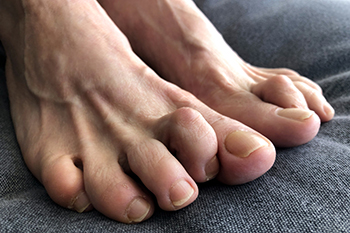Freehold (732) 294-9393
Freehold (732) 294-9393

All of the toes, except for the big toe, have three bony segments that are separated by joints. The foot condition that is known as hammertoe can cause the joints that are between the first and second segment to bend downward, and it generally affects the second and third toe. It is considered to be a deformity, and can be caused by genetic factors or from wearing shoes that do not fit correctly. These types of shoes typically do not have adequate room for the toes to move freely in and can change the shape of the foot. Many patients can experience pain in the ball of the foot, and difficulty in finding shoes that fit properly. Additionally, corns may develop on top of the toes as a result of friction that is caused by the toes constantly touching the top of the shoe. Hammertoe is easy to diagnose, and X-rays are often not necessary to take. Relief may come from performing specific stretches, and cushioned pads may be used on top of the corns. If you have developed hammertoe, please speak to a podiatrist who can diagnose and offer you correct treatment solutions, which may include surgery for permanent straightening.
Hammertoe
Hammertoes can be a painful condition to live with. For more information, contact Dr. Henry Miller from New Jersey. Our doctor will answer any of your foot- and ankle-related questions.
Hammertoe is a foot deformity that affects the joints of the second, third, fourth, or fifth toes of your feet. It is a painful foot condition in which these toes curl and arch up, which can often lead to pain when wearing footwear.
Symptoms
Causes
Genetics – People who are genetically predisposed to hammertoe are often more susceptible
Arthritis – Because arthritis affects the joints in your toes, further deformities stemming from arthritis can occur
Trauma – Direct trauma to the toes could potentially lead to hammertoe
Ill-fitting shoes – Undue pressure on the front of the toes from ill-fitting shoes can potentially lead to the development of hammertoe
Treatment
Orthotics – Custom made inserts can be used to help relieve pressure placed on the toes and therefore relieve some of the pain associated with it
Medications – Oral medications such as anti-inflammatories or NSAIDs could be used to treat the pain and inflammation hammertoes causes. Injections of corticosteroids are also sometimes used
Surgery – In more severe cases where the hammertoes have become more rigid, foot surgery is a potential option
If you have any questions please contact our office located in Freehold, NJ . We offer the newest diagnostic and treatment technologies for all your foot and ankle needs.